Simplify your day!
Declutter!
If you have to juggle fewer items in your day, then you have a calmer, more relaxed pace in your life.
More focus on the fewer things gets you better results in all areas of your life.
Here’s how you could start.
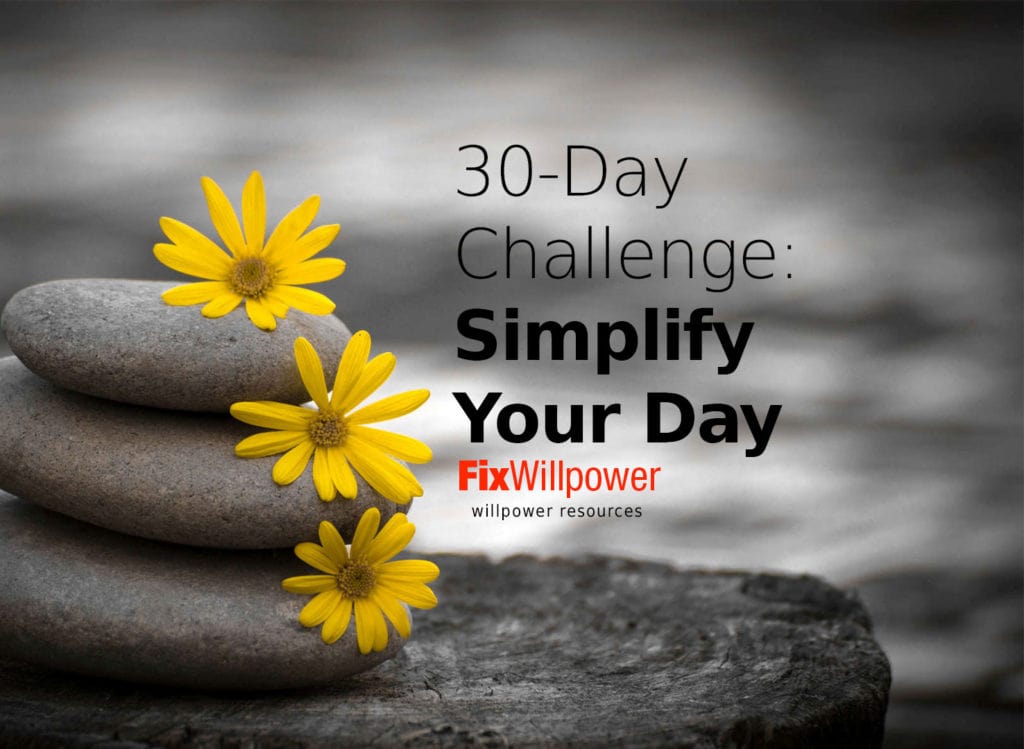
Take a 30-day challenge to make your day simpler, focused, and relaxed. I will do this for the next 30 days. Say “No” to one thing every day. Here are some things that you can say “no” to.
- Single-tasking.
- Blocking out 3 to 5 hours for deep work every week.
- Put your phone in airplane mode for one deep work session in the morning.
Whatever you may think, multitasking does not work and wastes your time and resources. Read more about how to stop multitasking.
1. Appointments and meetings that aren’t essential
First, cancel all the meetings you don’t absolutely have to attend. Meetings should not be events where everybody finally gets down to works and digs into the matter at hand.
Meetings are for making decisions so that everybody is up to speed, and there will be no misunderstandings later.
Ask everybody to come to the meeting prepared. It’s a total waste of other people’s time when somebody uses the meeting to do the work that should have been done separately. You are basically waiting for them to work.
Ask for the agenda. What decisions need to be made, and what are the main points of disagreement? If there are none, then you can decide via email.
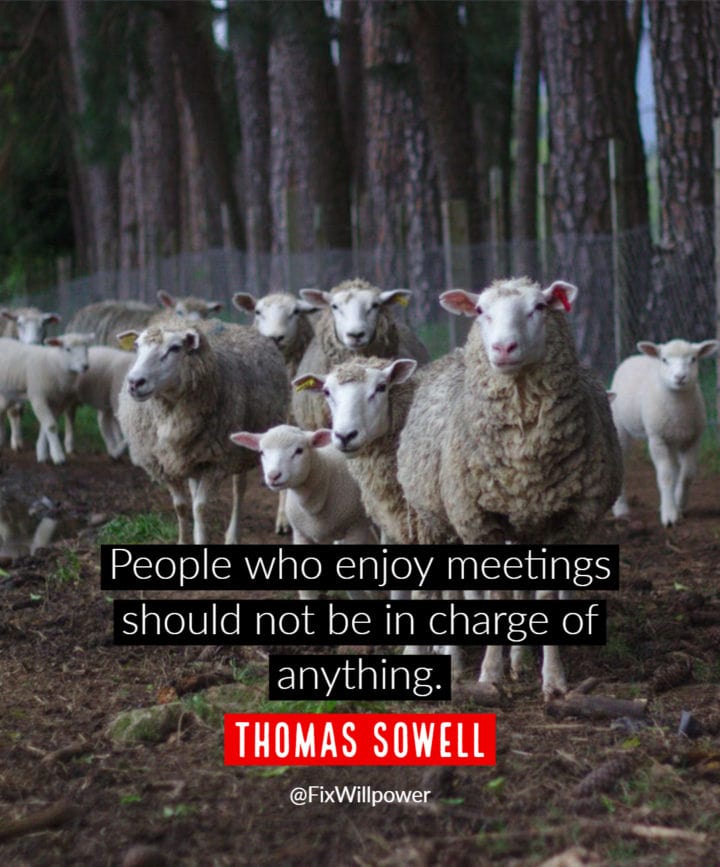
People who enjoy meetings should not be in charge of anything. – Thomas Sowell
2. Commitments you can let go
Most of us get ourselves entangled in things we don’t want to do. If you have commitments you want to get out of, do it now. Sooner is always better than later. We only have 24 hours every day, and we should spend those hours on something that moves you forward. Tell the other person can’t make it and give them the real reason.
Sometimes there are things you want to do, but the next available time-slot is in three weeks from now. Let others know, and if they really need it, they will wait three weeks or find someone else to do it.
Don’t lie.
3. Non-essential to-do items
What do you have on your to-do list that you can remove with no real consequences? Maybe there are some tasks that you can delegate to another team member? Find a way to outsource your non-essential tasks to a virtual assistant. If possible, hire a personal assistant and then delegate everything that you can.
And then there are projects that you wanted to do in the past, but never got to it. Drop the dead weight from your to-do list.
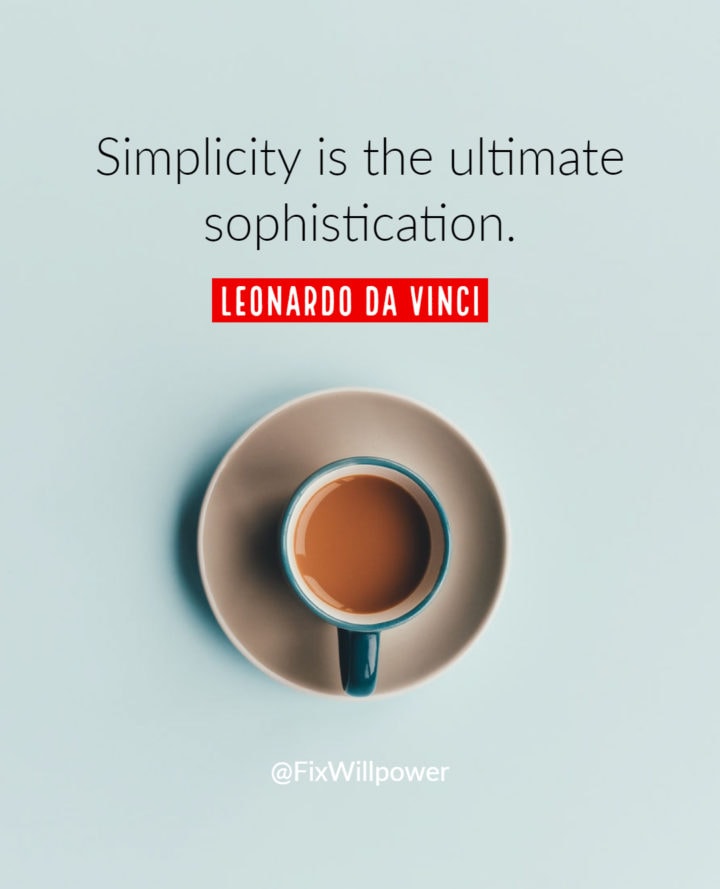
Simplicity is the ultimate sophistication. –Leonardo da Vinci
4. Multi-tasking
Just say no to multi-tasking!
Focus on one thing and do it until finished. If the task you have to do takes longer than you can spend right now. Split the task into smaller units that you can do in a certain amount of time. Good durations for this start from 25 minutes, and the maximum should be around 2 hours. Then commit to a single task and do it until completed.
5. Distractions
You can’t focus on your 2-hour task if your phone keeps buzzing every few minutes. When you are working, set your phone to silent and turn off all the notifications on your desktop computer. If you do not do this, then you won’t be single-tasking.
Sometimes a distracting thought appears out of nowhere while you work on something important. Have a pen and paper ready, write down the distracting thought, and get back to your work.
6. Moving quickly
Do everything now. Do not contemplate and postpone your actions. Decide and then make the first step. When you have a task that takes just a few minutes, do it immediately. Usually, there’s a 2-minute rule. If the task takes less than 2 minutes, then do it now. I use this rule quite freely up to 10 and 15 minutes. The rule helps to declutter your to-do list, and you have less mental load and things to track. Simplify everything.
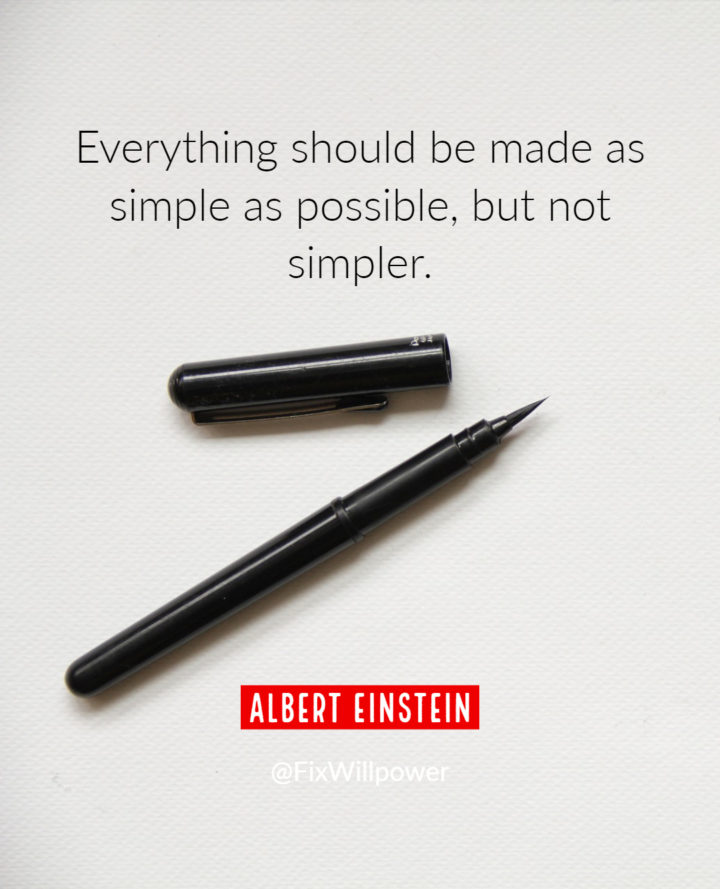
Everything should be made as simple as possible, but not simpler. — Albert Einstein
7. Avoid doing smaller tasks instead of important tasks
Do not procrastinate!
Focus on what’s important.
Avoid doing smaller tasks instead of important larger tasks. During the 30-day challenge, set aside one hour every morning when you focus on the most important thing at hand. The most important task will give you a feeling of accomplishment.
Then take another hour to clean up your clutter. Move quickly through the tasks that you can complete in a few minutes. As mentioned above:
- delete unnecessary tasks,
- delegate everything you can, and
- complete the things you can do in less than 15 minutes.
Here is a post about what simpler day means from ZenHabits.
Path to more productivity and doing just “one thing”
The fewer projects you have, the easier it is for you to complete the ones you are working on. I covered the multitasking point above.
The point of the “one thing” is broader and more strategic. If you work on several projects at the same time, then they will be completed at the same time.
Most of us rarely have the luxury of working on just one project. Always remind yourself that uncompleted work has almost no value. You will complete tasks faster when you single-task and work on fewer projects simultaneously.
Clutter in your mind
Some time ago, I counted that I had six concurrent and important projects going on. Everyone had a demand on my time, and nothing got finished.
I know that multitasking is not good for you, but I made sure that I didn’t multitask. One day, I worked two hours straight on one project and switched to another deep works session on the next project after the break.
The next day I took on something that felt urgent on that day. I was working pretty effectively on those projects.
Or so I thought.
Multitasking is multitasking. If you switch tasks before the project is over, then you are multitasking. It’s multitasking, even if the specific tasks get a meaningful amount of undivided time.
Time spent switching projects
The unavoidable time-waster is the time you spend switching context.
For example, I had a project running Google Ads campaign for a client. It takes time to dive into the task and load everything you need into working memory.
Next, I switch context and start to write an article for this blog. One article takes me more than one session to complete. When I unload the knowledge needed for this task, then returning to it will be harder.
But most people do just that.
How can they get things done?
If my experience indicates how people might deal with this, then the solution is less focused work. I won’t think as deeply. I will not consider all the aspects because my working memory doesn’t contain all the data I need to find deeper meaning.
You will do lower quality work!
The ONE Thing: The Surprisingly Simple Truth Behind Extraordinary Results
by Gary Keller, Jay Papasan
Find out about the benefits of prioritizing a single task. Look at examples of how to engage in those tasks with a singular focus.
You want fewer distractions and less on your plate. The daily barrage of e-mails, texts, tweets, messages, and meetings distract you and stress you out. The simultaneous demands of work and family are taking a toll.
And what’s the cost?
Second-rate work, missed deadlines, smaller paychecks, fewer promotions–and lots of stress.
Everything will happen later
Even if you do all the tasks on multiple projects as effectively as you would on a single project, there’s the time you waste on switching tasks.
You need some time to get up to speed and the time to offload your brain after you completed something. Then you have to load the next project, and a lot of time gets wasted.
But let’s say you are Superman and don’t waste time on task switching. You will still complete projects later than you would if you do them one by one.
Let’s say you have two projects of similar length. Five weeks each.
If you spend your time equally on those projects, then both projects will be ready in 10 weeks.
However, if you choose to work only on one project, then it will be ready in 5 weeks.
Sure, the other project will be ready in 10 weeks, but your work will be more productive, and the people waiting for you to finish will waste less time.
Here’s an example of time spend when doing one thing at the time or two:
AAAAA.BBBBB
A.B. A.B. A.B. A.B. A.B
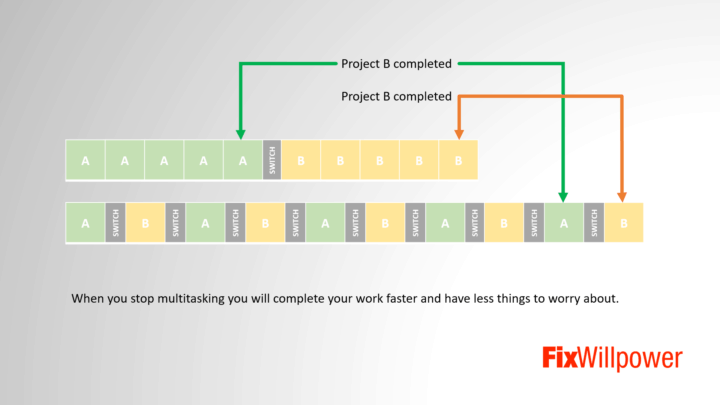
On the image above, you see that you can ship the project A in five weeks. After you complete project A, you move to project B and continue single-tasking. Everybody gets results faster this way.
Multitasking will push the completion of both projects far into the future.
You will waste time even if you chunk some work into larger batches.
AAA.BB. AA.BBB
Whenever possible, complete one thing before taking on another. If you only have to keep one project in your mind, you will also produce better results.
I can’t focus because I must juggle so many things
What if you simply must do everything!
You have 10 clients, and you must take kids to school, and you have to do the chores at home.
Acknowledge the problem, multitaskers pay a mental price.
[Multitaskers] couldn’t help thinking about the task they weren’t doing. The high multitaskers are always drawing from all the information in front of them. They can’t keep things separate in their minds. ~ Eyal Ophir
If you are an employee or you have a team that depends on you, then you may feel that your hands are tied.
People can rarely work on just one thing. But make the best of the situation you have.
Simplify everything!
Say no to all non-essential tasks that come up.
As you can see from the image above, you don’t have to drop all the projects. Find ways to work longer on each item, so you waste less time switching tasks.
If you work for yourself and you make your own decisions, then start single-tasking on everything.
You will become so much more effective. Your life will become a lot simpler when you don’t have to juggle ten tasks at the same time.
Be calmer and more relaxed
After you have set your priorities and work in a less frantic environment, you will become calmer. The relaxed state you have will help you do better quality work. Better quality work will let you charge more. Charging more will let you do fewer projects.
This is the positive feedback loop that the simplified life will give you.
Even if you don’t want to work less, you will have a choice, what to do with the time you freed up by simplifying your day. Work more or go to the park with your spouse, kids, dog, or alone.
However, there should be some variety
Now, all this does not mean that you can’t have variety.
Even if you work on one project, you should switch things up. There are different tasks in every project.
Find natural breakpoints, where you take a break from one type of work and then do something different. You will go numb if you have to do the same thing day long.
For example, if you are working on a Facebook ad campaign for a client, then you could switch that up with analyzing the results of your content marketing in Google Analytics. For the casual observer, it may seem that you do just “marketing stuff,” but for a professional, these are entirely different tasks.
Or maybe you are renovating your house. First, paint a wall and then fix the tiles on the floor. It’s the same project, but it will give your mind much-needed variety.
And, of course, make sure you take breaks.
Next step
You don’t have to go all-out hardcore on the simplifying project.
For the next 30 days, you can try various activities and projects you have in your life and figure out which ones you can eliminate.
Even if you can eliminate one thing, your life will be simpler, and you would easy your mental load.
After you make your day simpler, you could take on another 30-day challenge to improve your life in other areas. For example, I completed a 30-day writing challenge that made me a better writer and a clearer thinker.
________________________
Image: Piedras de primavera, spring stones by Vicente Villamón

![Read more about the article 5 Steps to Truly Listen to Someone and Understand [VIDEO]](https://fixwillpower.com/wp-content/uploads/truly-listen-429x314.jpg)
![Read more about the article How to Write Down Your Goals to Get Results in 2024 [VIDEO]](https://fixwillpower.com/wp-content/uploads/write-down-your-goals-429x314.jpg)
![Read more about the article 30 Ways How to Improve Your Life, Get Results, Be Happier [in 2024]](https://fixwillpower.com/wp-content/uploads/improve-your-life-429x314.jpg)
![Read more about the article Take a Day Off to Enjoy Your Life [Regularly]](https://fixwillpower.com/wp-content/uploads/take-a-day-off-429x314.jpg)